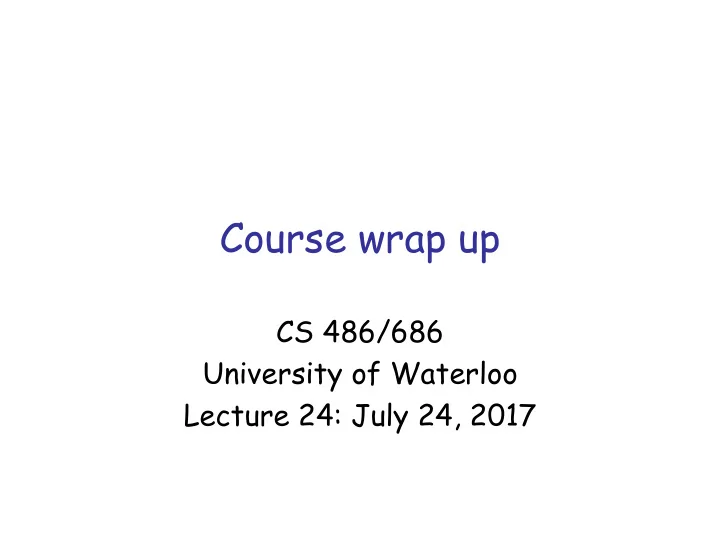

Course wrap up CS 486/686 University of Waterloo Lecture 24: July 24, 2017
Outline • Course wrap up • Final exam info (see course website) • Other AI courses, options and programs • AI research • AI jobs 2 CS486/686 Lecture Slides (c) 2017 P. Poupart
Topics Covered • Search algorithms • Probabilistic Inference • Decision Making under Uncertainty • Machine Learning • A bit of Natural Language Processing • A bit of Robotics 3 CS486/686 Lecture Slides (c) 2017 P. Poupart
Topics That We Didn’t Cover • Computer Vision • Natural Language Processing • Robotics • Multi-agent Systems 4 CS486/686 Lecture Slides (c) 2017 P. Poupart
Other AI courses • CS485/685: Theoretical Machine Learning (Shai Ben- David S18) • CS489/698: Intro to Machine Learning (Yaoliang Yu F17, Pascal Poupart W18) • CS484/684: Computer Vision • CS499R: Readings in Computer science • CS499T: Honours thesis 5 CS486/686 Lecture Slides (c) 2017 P. Poupart
AI Option • Bachelor in CS or SE with AI Option (starting F18) • Joint option between CS and Engineering • 7 courses – CS 486: Intro to AI – CS 492: Social Implications of Computing – One of • CS489: Intro to Machine Learning • CS485: Machine Learning Theory – One of • SE 380: Intro to Feedback Control • ECE 486: Robot Dynamics and Control • ECE 380: Analog Control • MTE 546: Multi-sensor Data Fusion – Three additional elective courses 6 CS486/686 Lecture Slides (c) 2017 P. Poupart
Elective Courses in AI Option • Three additional elective courses among – CS489: Intro to Machine Learning – CS485: Machine Learning Theory – CS452: Real-time Systems – STAT341: Intro to Computational Statistics – STAT440: Computational Inference – STAT441: Statistical Learning: Classification – STAT444: Statistical Learning: Function estimation – ECE423: Embedded Computer Systems – ECE481: Digital Control – ECE486: Robot Dynamics and Control – ECE488: Multivariate Control – MTE544: Autonomous Robotics – MSCI446: Data Warehousing and Mining – SYDE372: Pattern Recognition – SYDE552: Machine Intelligence – SYDE556: Simulating Neurobiological Systems 7 CS486/686 Lecture Slides (c) 2017 P. Poupart
Data Science • https://uwaterlo.ca/data-science • Bachelor’s degree in data science – Available soon • Master’s degree in data science – Joint program between CS and Statistics – 8 courses • STAT 845: Statistical Concepts for Data Science • STAT 847: Exploratory Data Analysis • CS 651: Data-Intensive Distributed Computing • One course among – CS648 Database System Implementation – CS689 Intro to Machine Learning – CS685 Machine Learning Theory • 4 additional elective courses 8 CS486/686 Lecture Slides (c) 2017 P. Poupart
Waterloo AI Institute • Web: uwaterloo.ca/artificial-intelligence-institute • Joint institute between Math and Engineering • Foundational AI – Machine learning, statistical learning, data mining – Probabilistic models, knowledge discovery, knowledge representation – Intelligent agents and game theory – Optimization and decision making – Data science and analytics – Affective computing and human-machine interaction • Operational AI – Scalable AI: commercialization by both small startups and large corporations – Compact AI: deployed wherever cost, energy and bandwidth are limited – Secure AI: private data protected locally, metadata shared by cloud users – Accessible AI: tailored for ease of use – Dependable AI: with reliable performance regardless of connectivity – Transparent AI: performance of safety critical systems can be certified 9 CS486/686 Lecture Slides (c) 2017 P. Poupart
AI research group in CS • Web: ai.uwaterloo.ca • Professors: – Peter van Beek (applied machine learning, constraint prog.) – Shai Ben David (learning theory) – Robin Cohen (multi-agent systems, user modeling) – Jesse Hoey (health informatics, applied machine learning, computer vision) – Kate Larson (game theory, mechanism design) – Edith Law (social computing, human-computer interaction) – Richard Mann (computational audio, computer vision) – Pascal Poupart (machine learning, natural language processing, health informatics) – Yaoliang Yu (machine learning, optimization) 10 CS486/686 Lecture Slides (c) 2017 P. Poupart
Pascal’s research projects • Machine Learning and Planning – Sum-Product Networks – Bayesian learning – Reinforcement learning – Data Complexity Analysis • Natural language processing – Conversational agents – Natural language understanding • Health Informatics – Mobile health, activity tracking, emotion recognition 11 CS486/686 Lecture Slides (c) 2017 P. Poupart
AI jobs • Data Science: golden age of Machine Learning • AI is revolutionizing Computer Science – Machine Learning: new paradigm that avoids programming – Computer vision: computers can finally see – Natural Language Processing: new paradigm for HCI • All large companies have AI R&D groups – Google, Microsoft, Facebook, IBM, Amazon, Baidu, Huawei • Many small companies use AI – ProNavigator, TalkIQ, Focal Systems, HockeyTech, Kik Interactive, In the Chat 12 CS486/686 Lecture Slides (c) 2017 P. Poupart
Recommend
More recommend